Jewish mythology is as expansive as it is storied, with a long history containing a vast range of mythological creatures and elements. From recognizable figures like the Angel of Death and the demon Ashmedai to lesser-known demons called Ruchin and the Tzavua, a beast whose coat is said to have 365 colors, Jewish mythology is rich with stories waiting to be told.
Recently, there’s been an uptick in Jewish representation in the fantasy genre. Where once I sat down to write the Jewish fantasy I wanted to see on the shelves, now my bookcases are full of new favorites, from stories exploring Jewish life in Eastern Europe to fantastical worlds that only just resemble our own.
Each of these recent additions explores Jewish mythology in fresh and exciting ways, which made narrowing down a short list difficult. Without further ado, here are three fantasy books featuring Jewish mythology that should definitely be on your shelves, and two upcoming releases that I can’t wait to get my hands on!
From Dust, A Flame by Rebecca Podos
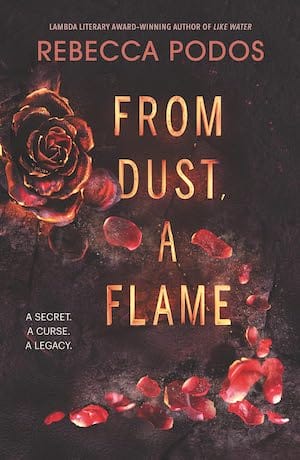
Golems are one of Judaism’s most recognizable creatures of mythology. Crafted from clay and water, these beings are brought to life by ritual and the spoken word—a reoccurring theme in Jewish mysticism, which teaches that language can shape creation (more on this in my next recommendation!). They feature frequently in the role of protector in Jewish stories, representative of a people often faced with persecution, but have been reimagined in modern fiction in countless ways, such as in From Dust, A Flame.
On Hannah’s seventeenth birthday, she wakes up with golden eyes, the first of many inexplicable mutations to come. When her mother disappears after promising to find someone who can break her newfound curse, Hannah sets out with her brother, Gabe, to find answers of their own. Their journey introduces them to estranged family, generational secrets, and an incomplete golem that Hannah and Gabe bring to life. But as her family’s past catches up to her, Hannah must unearth all their secrets if she’s to have any chance of breaking her curse and saving the people she loves.
This book is wrought with themes of intergenerational trauma, complex family dynamics, and the power of stories, all layered within a magical tale of golems, demons, and curses.
The Wolf and the Woodsman by Ava Reid
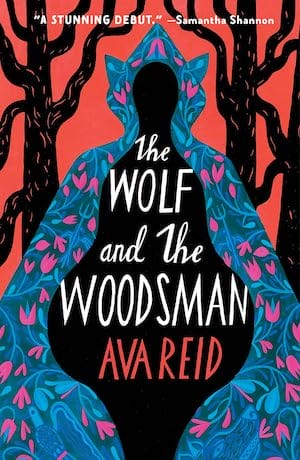
One of the more unique facets of Jewish mysticism (and as an author, one I find the most fascinating) is the idea that language can shape creation. The concept suggests that God created the world using the Hebrew alphabet, a notion that lends itself well to unique magic systems, such as one of those found in The Wolf and the Woodsman.
As the only woman without magic and an outcast due to her Yehuli blood, Évike is betrayed by her village and sent with the Holy Order of Woodsmen as the king’s blood sacrifice. But when the Woodsmen are slain by monsters, leaving Évike alone with their cold captain, Gaspar, so begins an adventure through dangerous woods, frozen lands, and the capital in which her father lives. There she learns a new type of magic—the power of language, an ability Évike will need to protect what matters to her.
This book is perfect for fans of Naomi Novik’s Spinning Silver and Katherine Arden’s Winternight trilogy, both of which contain the same rich storytelling and folklore feel of The Wolf and the Woodsman.
The Ghosts of Rose Hill by RM Romero
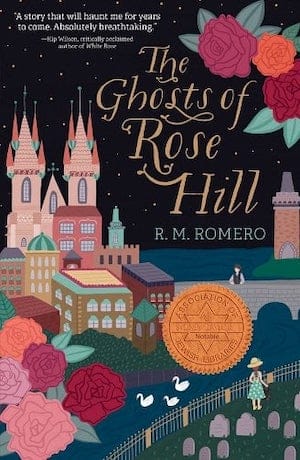
There are many types of spirits in Jewish mythology, from the friendly Ibbur that possesses its typically willing host in order to complete a task to the more dangerous dybbuk, an evil spirit that takes over a host. Whatever their nature, their presence and interaction with the human realm is a recurring theme in Jewish stories, and well explored in The Ghosts of Rose Hill.
Ilana longs to become a violinist but struggles with her parents’ wishes that she would choose a more practical career. When they send her to stay with her aunt in Prague to experience exactly how an artist lives, she stumbles across a forgotten Jewish cemetery and the ghost of a friendly boy named Benjamin. While Illana restores Benjamin’s grave, he introduces her to the spirits and wonders of Prague, where she captures the attention of Rudolph Wassermann, who offers her magic in exchange for her music—a gift that does not come without strings.
Told in verse, this story is at once as haunting as it is healing. Full to the brim with atmosphere, it deftly explores heavy topics of finding oneself, the impacts of war, and the ways that history seeps into the present.
When the Angels Left the Old Country by Sacha Lamb
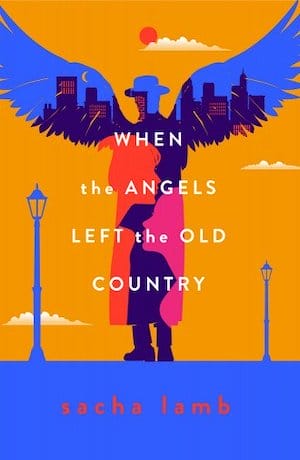
Like many things in Jewish mythology, the existence of demons—or Sheydim—has countless explanations, from the belief that they’re fallen angels to the possibility that they’re simply souls without bodies. They range from the mazzikim, said to cause minor transgressions or disruptions, to the famous name of demons like Ashmedai, who features in When the Angels Left the Old Country. Recently released, it’s the first of two books I can’t wait to read!
When a young emigrant from their Shtetl goes missing, Uriel the Angel and Little Ash (short for Ashmedai), set out in search of her. As they journey to America, they help the humans they encounter best they can, but their path is paved with obstacles in a new and unknown land full of crime and corruption.
This book sounds like a transformative journey with a foundation in Jewish storytelling.
The Night Owls by AR Vishny (2024)
Estries are a lesser-known creature from Jewish mythology, but most closely resemble the well-known vampire. In contrast, Estries are strictly female, and thought to be able to transform into birds or various other animals. As suggested by the title of the second book I’m eagerly anticipating, the main characters of The Night Owls are Estries capable of changing into owls.
Not much has been shared about this upcoming fantasy, save that it follows two girls who break an oath never to fall in love when they descend into Manhattan’s monstrous underworld to save a girl.
Buy the Book
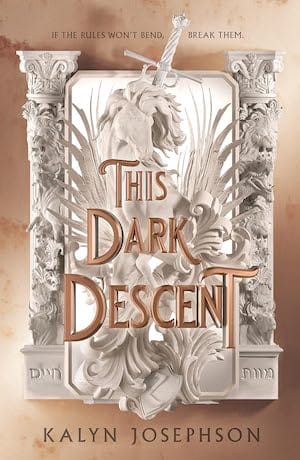

This Dark Descent
Kalyn Josephson works as a technical writer in the tech industry, which leaves room for too many bad puns about technically being a writer. She grew up in San Luis Obispo, California, and graduated from Santa Clara University with degrees in Biology and Creative Writing. Currently, she lives in the Bay Area with two black cats (who are more like a tiny dragon and an ever tinier owl). She is the author of the Storm Crow duology as well as the middle-grade series, Ravenfall.










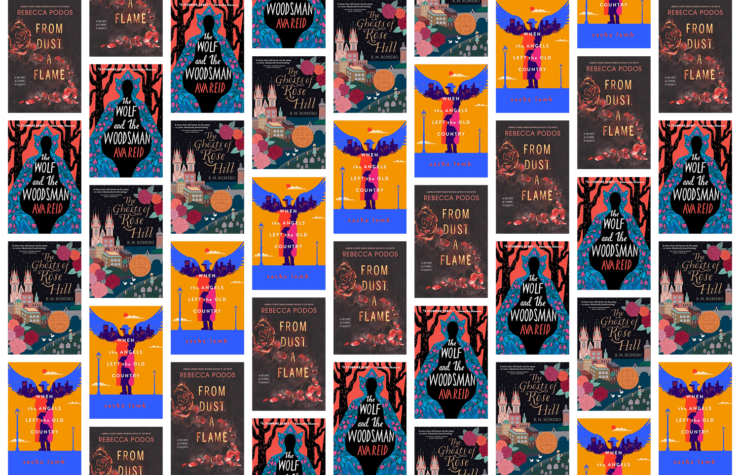
Aden Polydoros’ upcoming Wrath Becomes Her has a female golem thrust into the middle of the Jewish Resistance during WWII. I tore through an advance copy, because mysticism and the nature of being human and punching Nazis all go well together.
Ariel Kaplan’s new release The Pomegranate Gate melds Jewish mythos and historical fiction and I loved it.
And anyone who hasn’t read Helene Wecker’s The Golem and the Jinni and its sequel The Hidden Palace is missing out!
“The Yiddish Policemen’s Union” by Michael Chabon.
Yeah, don’t miss When the Angels Left the Old Country. I’d also recommend the recentish book of short stories Burning Girls by Veronica Schanoes.
Matt Kressel’s “Worldmender” series (“King of Shards”, “Queen of Static”) is heavily rooted in Jewish mythology (and well worth reading).
There’ve also been a couple of anthologies of Jewish speculative fiction that came out just recently: “Other Covenants” and “Jewish Futures: Science Fiction from the World’s Oldest Diaspora”.
@1
Speaking of Polydoros, The City Beautiful is all about a dybbuk and being a queer Jew.
@2
That one doesn’t involve mythology as such, but it’s a very good book. Most of Chabon’s work is lit-fic,.but SFF fans are also likely to enjoy his historical novel Gentlemen of the Road
,
The Golem and the Jinn Helene Wecker
Stephen Billias’ The Quest for the 36 certainly fits this cluster – though it may only be findable used at this point, having been a Questar title from way back in 1988. The tone is light (as may be deduced from the name of protagonist and narrator Dexter Sinister), but the execution is a thoughtful and clever working-out of the title legend.
Let me refer you all to a classic sf tale, A Judgment of Dragons by Phyllis Gottlieb. A tale featuring star cats and a rabbi!
Edward Erdelac’s Merkabah Rider stories.
This is more of an academic book ABOUT Jews and Jewish themes in Sci-fi and fantasy (full disclosure I am responsible for chapter 12 “The Quest for the Kosher Dragon: Who’s the Mensch in Middle-earth?”
https://www.amazon.com/Jews-Popular-Science-Fiction-Marginalized/dp/1666901458
See also Unholy Land by Lavie Tidhar. Set in the present day an alt-history world where the Jewish state was established in the early 20th century in what is now Uganda (an actual proposal), the protagonist, who turns out to be an unreliable narrator, seems to be shifting through mulitverse iterations of proposed Jewish states, uncertain as to which one is the “real” one.
Don’t forget Spinning Silver by Naomi Novik!
I’m very excited to read these and am putting them on my must read list
@12: How much does Spinning Silver fit into specifically-Jewish mythology? It’s definitely an inversion of the antisemitic aspects of the story usually titled “Rumplestiltskin”, but the fantasy elements seemed borrowed from Christian and pre-Christian Russia rather than Judaism; I’m familiar with only the most-known elements of Jewish mythology, so I may have missed something.
@0: Lamb’s book wasn’t quite what I was expecting — it won the 2023 Mythopeic award for adult novel, where it struck me as written more for YA — but it was definitely fascinating (I saw a variation of Aziraphale and Crowley, especially in the TV version, in the relationship between the angel and the demon), mixing mythology with very real history.
Not a novel, but IMO worth reading for anyone who has a few minutes: Silverberg’s “The Dybbuk of Mazel Tov IV”, in which secular Jewish refugees some time in the future have to cope with what they think of as an obsolete superstition. An original in Wandering Stars, an anthology mixing originals with old stories by people known mostly for SF , which is worth picking up if you see a copy.
Not that she needs the sales – but Anne Rice’s Servant of the Bones qualifies. And is literally the only book of hers I ever finished. Beautiful, lyrical, and winsome.
“The Sound of Gematria” by Judith Field. Involves mathematics, music and a deadly plague.
GennaRose Nethercott’s novel Thistlefoot is an absolute do-not-miss read that deals with pogroms and the diaspora, Jewish folklore, and Slavic folklore. It’s outstanding.
For those unaware, I maintain a bibliography of Jewish SF/F at http://www.stevenhsilver.com/jewishsf.html
Published in 1991, Marge Piercy’s He She and It alternates between a Jewish pocket of respite in a dystopian North American future and Prague 1600. In the future, Jewish technophiles create a dangerous robot. In the past, a Rabbi creates a golem to protect the Jews.
@14 Spinning Silver’s protagonist is Jewish and a major part of the plot involves requiring her fairy king husband to accede to her religious traditions. He wants her to work turning silver into gold, but she won’t work on the Sabbath and his realm is perpetual twilight so she has no way of knowing what day it is. Not to mention a constant threat to her people from the local goyim, the bone-deep fear of imminent pogroms, the literal hidden passage out for the Jews to flee through and a million other bits of Judaica sprinkled throughout.
It sure felt like it featured Jewish mythology to me.
Lisa Goldstein’s red magician
The Mangoverse by Shira Glassman. Absolutely Jewish fantasy.
And the recent Michael Chabon book. The Amazing Adventures of Kavalier & Clay, with golem, alternate history and superheroes that win WW II.
@20: unfortunately, nothing that you cite is mythological; it’s all part of the all-too-real experience of common-era Judaism (which probably has enough additional genre instances for a column of its own). This is also true of most of Wandering Stars; the Silverberg I cited is an exception.
@20
Spinning Silver is unquestionably Jewish fantasy, but it’s not fantasy based on Jewish mythology, which is a slightly different thing. Chernobog is a Slavic demon, the Staryk are a type of faerie that’s based on Celtic and Scandinavian lore to the extent they aren’t original to Novik’s work. There’s no dybbuks, golems, rabbis with cosmic knowledge (or even good advice; Miriam takes her problems to her grandfather, not a rabbi), or any kind of supernatural entity or occurance connected to Judaism or Jewish lore in any fashion.
Much, if not all of Gillian Polack’s work has significant Jewish underpinnings..in particular The Wizardry of Jewish Women gives a big clue in the title, but also The Time of the Ghosts and The Green Children Help Out deserve your attention.
In my opinion Polack is one of the best, yet underrated, Fantasy writers active. She really needs to be featured more.
And for audio books fans, the recently issued Time of the Ghosts is magnificently read, performed even, by Amanda S Brown.
Primo Levi “The Servant” is a straightforward golem story, but now I’m wondering how many other of his stories included elements of Jewish mythology that I’ve not noticed (since I have, as the man said, no ancestors of that gifted people).
I am just now reading When the Angels Left the Old Country, about a Jewish (there are Gentile demons as well) angel and demon leaving the tiny shtetl where they’ve spent the last several centuries to go to late 19th century New York City in search of a young woman who emigrated and nobody has heard from her since. I definitely recommend it.